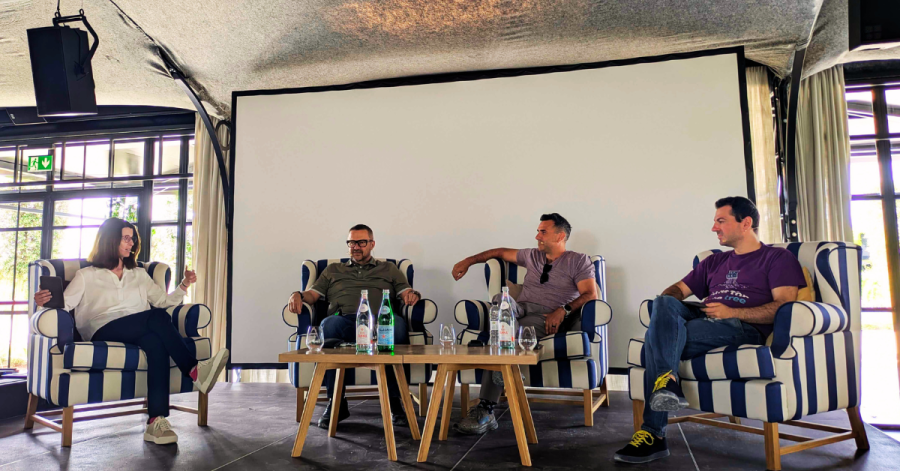“I never compromised on control.” That was one of the enduring messages from Sacha Dragić at the 3rd edition of the Hellen’s Rock Capital Founder Retreat. The founder of Superbet, who recently secured a €1.3B refinancing deal, shared the philosophy behind his journey: building a multi‑billion‑euro company in a constrained ecosystem, attracting major investors along the way, yet ensuring it could grow into a lasting legacy rather than a venture‑dependent business.
In Istria this June, Hellen’s Rock Partner Andrea Cordas opened the capital‑themed session by warning that “capital is a tool with weight” – it brings “pressure, expectations, and often distortion” if not handled clearly. The goal was “capital clarity”: when to raise, from whom, and how to manage funding without derailing the company. The panel brought together three founder‑first investor voices, each offering a different lens on what it takes to finance growth without compromising vision or governance.
The playbook for lasting growth
At the table, Sacha Dragić was frank about his philosophy. He has grown Superbet into a multi‑billion‑euro gaming group – recently securing a €1.3 billion refinancing led by Blackstone – yet he insisted he “never compromised on control.”
For him, this wasn’t about holding power for its own sake; it was about building a company able to sustain itself and continue growing for decades.
Dragić described how he structured each round to protect founder influence. For example, if an investor down‑valued Superbet, Dragić agreed to take that lower price only on the condition that he could buy back their shares at the same discount later. In practice, he funneled later infusions into repurchasing equity, ensuring the company’s long‑term independence.
He also relied heavily on debt in the early years — “in the early days, I was using way more debt than equity,” he said — precisely so he could delay selling shares. In his view, equity dilution was secondary to preserving the company’s direction and mission.
To sharpen his approach, Dragić studied the strategies of French tycoons like Arnault and Bolloré, drawing lessons on how to chart long‑term growth.
This generational mindset guided his choice of investors. Even when Dragić had multiple term sheets, he didn’t just take the highest bid. “I never chose the investor who offered me the best financial conditions,” he said. “I always chose the investor with whom I felt I had the most chemistry.” In one 2018 fundraise, he had six offers on the table but steered the deal to Blackstone – even though he was “the only one who was for Blackstone” among his team. For Dragić, relationships and alignment mattered more than headline valuations.
Dragić’s story is framed by regional reality. As he pointed out, Eastern Europe lacks deep venture capital and seasoned VCs. He said the market “forced you to bootstrap”: there was no “luxury to raise… an inflated valuation,” because CEE just doesn’t have “the quantity of venture capital… [or] sophisticated investors.” Many local funders, he explained, treat startups like safe real‑estate bets. He noted that Latin America faces similar constraints. In both under‑capitalized regions, founders often grow firms slowly out of necessity – which by default helps founders keep stakes higher.
How to make investors chase you
Brian Requarth, a tech entrepreneur turned VC investor, echoed the need for founders to assert themselves. Requarth co-founded proptech VivaReal (post-merger with ZAP, it sold to OLX for $640M) and has backed 80+ Latin American startups. He told the retreat: “Founders should make the investor feel like they’re getting to you… you wanna be chased.” In practice, this means founders should manage the process, not beg. Rather than pitching to every top fund by name, build momentum and scarcity around your deal.
Requarth also urged founders to reverse-due-diligence investors. Ask hard questions – it signals confidence. He gave the example of asking about a VC’s capital. If a founder asks, “Hey, what’s your fund cycle? How much capital do you have left?” it shows maturity. “When I hear those questions, I go, ‘This founder kind of understands the game,’” he explained. In other words, a savvy founder tests the investor just as the investor tests the startup.
On choosing the right backer, Requarth emphasized personal alignment over name-brand shine. As Requarth put it, the best investors are partners, not just check-writers.
To reduce the guesswork, Requarth shared his own approach from his last fundraise:
“I made a list — I think of like seven criteria of the things that I cared about the most. I actually assigned a value to each of those. So for me, I wanted someone that was a global investor with a strong brand. And I assigned additional value to that. And then I literally told the investors what I was assessing. I kind of assessed them versus them assessing me. It seems almost arrogant to do that, but the truth is, you change the power dynamics a little bit.’”
Spotting the traps in early fundraising
Vlad Ciurca, a long-time mentor, angel investor, and Techsylvania co-founder, detailed warning signs to watch for. He’s seen many hopeful entrepreneurs pitch too early or target the wrong investor. “Some founders don’t do their research properly,” he said. For example, he’s heard founders say, “I want to talk to Andreessen, Sequoia” or other big names irrelevant to a Romanian seed-stage startup focused on the EU market. Ciurca looks at such a mismatch as a red flag on the founder side: it shows the team isn’t even aligned on where they want to go. He echoed Brian’s takeaway: spend six hours sharpening the axe. If you’re B2B, don’t chase a strictly B2C fund; if you’re seed, don’t chat up a growth-stage firm.
Ciurca also advised rigorously vetting term sheets. He’s seen founders skip crunching the numbers: they forget to negotiate the option pool size or voting rights. “They don’t figure it out… how much the option pool is, or what are all the term sheet details… I should accept at the early stage,” he said. The result can be “giving out too much control in the very first round.” In short, surrendering key governance rights early is a trap.
What this conversation made clear is that control isn’t something founders are given — it’s something they have to construct deliberately. That might mean walking away from better valuations, building the right ownership structures, or simply asking the questions that many first-time founders don’t. Especially in ecosystems where capital is still relatively scarce and expectations are imported from more mature markets, playing the standard game is rarely an option.








